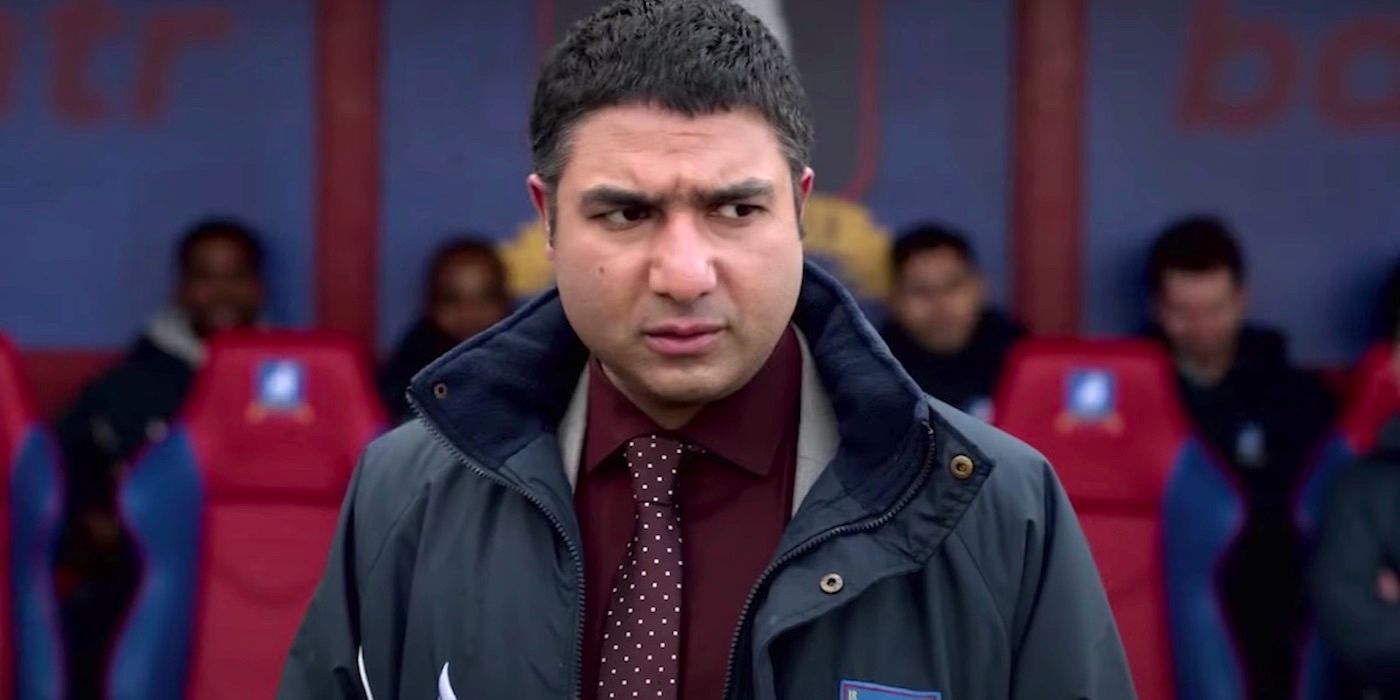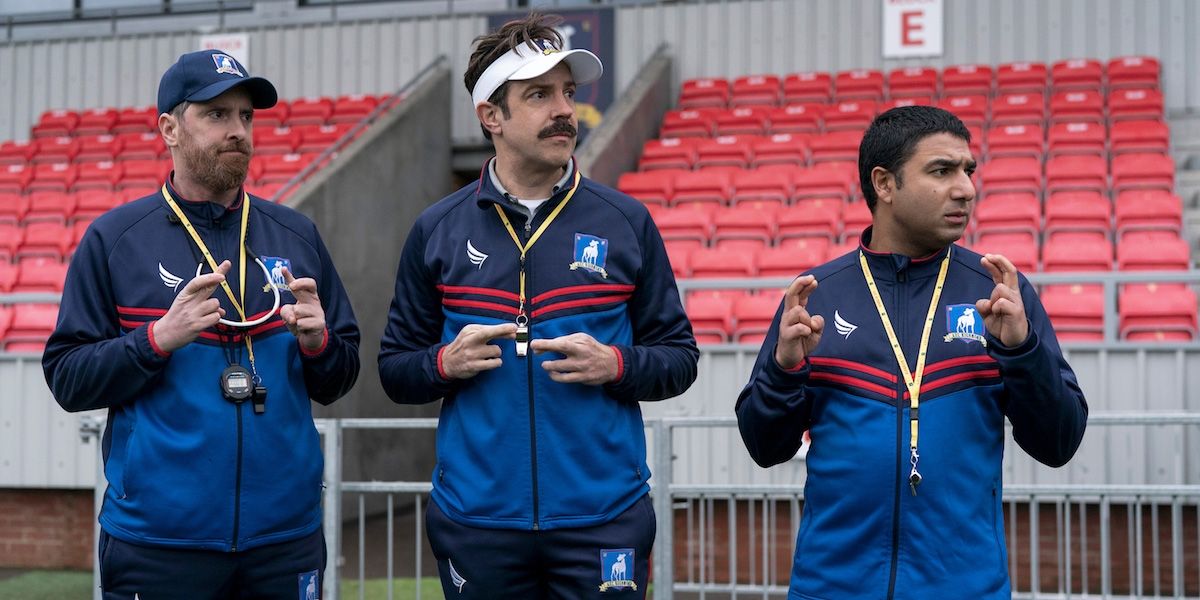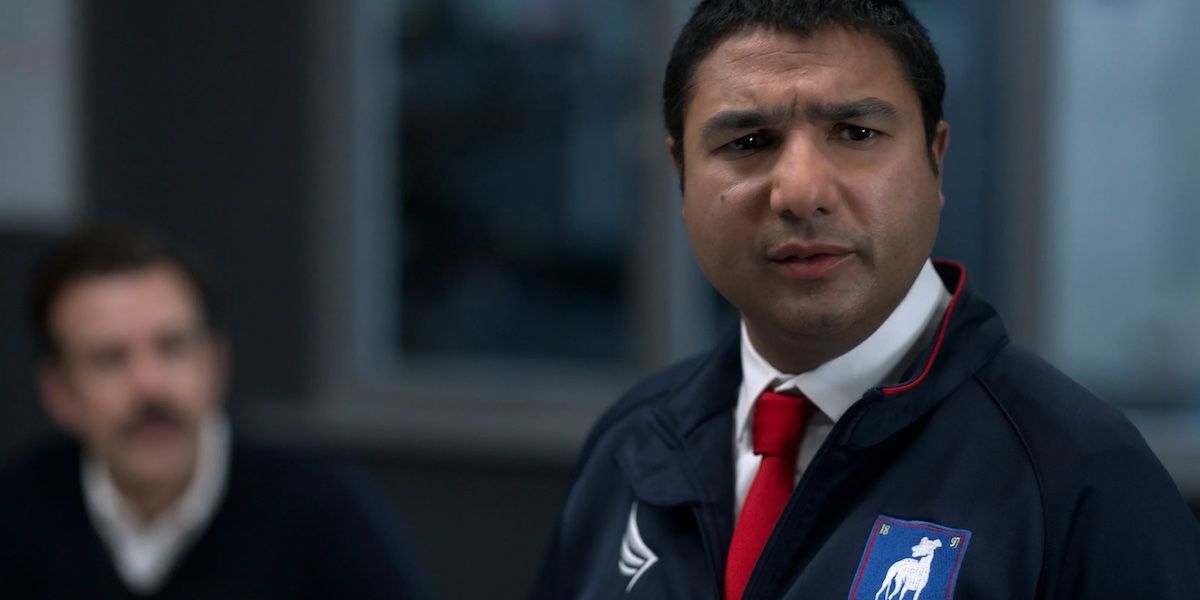Nathan Shelley (Nick Mohammed) is initially introduced in Season 1 of Ted Lasso as a kind man that Jamie Tartt (Phil Dunster) and his cronies on the Richmond team harass for fun. Nate is the team’s kit man and is often a punching bag for the more juvenile members of the team. But when Ted (Jason Sudeikis) becomes the team's coach he starts shaking things up for Richmond in a major way and that includes helping Nathan to combat the harassment and learn to stand tall. Throughout Season 1 Nate is a positive force on the team and by the end he is fully brought into the fold not only as a friend to the team but with a promotion to the role of assistant coach. It seems Nate is on the up and up but Season 2 proves his trajectory is far from what we may have expected.
Nate is an easy punching bag in Season 1 because he’s incredibly insecure. He feels like he's never lived up to his father’s expectations, he holds a minor role on a poorly performing football team, and he is made into the locker room laughingstock nearly every day. Nate is used to being made to feel less than, and he internalizes that feeling. So in Season 2 we see that insecurity warring with his growing sense of ego. His newfound position and acclaim leads to him only seeking more. As he tells Ted at the end of the season, he was made to feel special, and now he wants more. And as we see his actions take a downward turn as the season progresses we see his behavior manifest in a toxicity that starts to hurt not just himself but those around him.
For a show focused on football, one might expect the toxic elements to come mainly from characters like Jamie Tartt who present a more stereotypical display. The overly macho bravado, objectification of women, and a lack of connection to one’s emotions are some of the first things one might think of when they hear the words “toxic masculinity”. But Nate is nothing like that. Nate is sensitive, often doubtful of himself, and can’t seem to get a date to save his life. His toxicity comes from feeling like these things are faults. Nate is not the toxic alpha male, he’s the jaded incel who wants to blame the world for everything wrong in his life.
There was a sense that something was off about Nate from the start of the season. And when Roy joined on as another coach the tensions were obvious from how uncomfortable and displeased he looked seeing him on the pitch. But nonetheless Nate kept trying to do what he could. It reached a peak however when Ted had to leave a match because of a panic attack and Nate gave the final commands that won Richmond the game. After an interview where he accidentally dubbed himself “The Wonder Kid” a small amount of buzz was brought to his name and Nate became obsessed with seeing people talk about him online. That validation he’d felt from Ted in Season 1 was now being shouted at him a hundredfold from random users on Twitter and that only served to inflate his ego. He started to believe this acclaim wasn’t just something he’d worked for but something he inherently deserved.
Nate’s toxicity manifests frequently in a sense of entitlement. He worked hard in Season 1 and earned his role as an assistant coach but he seems to think this new role means he needs to be treated differently. He makes comments to Roy (Brett Goldstein) and Coach Beard (Brendan Hunt) about how he thinks Ted takes all the credit for the moves they come up with. And when Ted later explicitly names Nate’s move after him, he turns the argument around and instead says Ted is only doing that so that if the move goes wrong people will blame him if it goes wrong. Nate keeps trying to reframe his relationship with Ted into one of antagonism to justify the anger he has towards him for simply doing what he has always done.
Nate takes particular umbrage with the fact that Ted has been focusing so much on others this season. Whether that be other team members or his own mental health, Nate takes this lack of attention as a slight against him. His insecurity tells him that Ted was only using him though anyone watching could tell just how wrong that assumption is. He feels like he isn’t special anymore, so he takes it out on Ted through being cold, rude, and deceitful. And when that isn’t enough to satisfy Nate’s feelings of insecurity, he betrays Ted’s trust by leaking the news about his panic attacks to the press.
Nate has started combating his own insecurities by externalizing them. Previously, he would internalize them and that would further diminish his sense of self-worth but with Ted’s help he was able to build a bit of confidence. Now he’s using that confidence to take it out on other people. They hire a new kit man and Nate makes it his mission to treat him as poorly as he was treated when he held the same role. Externalizing his negativity gives him a sense of power. He wants to keep asserting his new place in the hierarchy and that means he doesn’t want to foster those playful and fun relationships he established in the first season. Where he previously roasted team members with a sense of comradery, now it comes off much more aggressively. There’s no playfulness there anymore. When the team makes him a custom-made “Wonder Kid” Richmond jersey he takes it not as a kind act of inclusion but as a slight against him. Nate has become more emotionally closed off because he perceives any act of humor or childishness to be some sort of attempt to put him back in his “rightful” place in the pecking order done only to belittle him.
Midway through the season, Nate is trying and failing to book a good table at a restaurant for his parent’s anniversary. When he goes to Rebecca (Hannah Waddingham) and Keeley (Juno Temple) about this issue hoping Rebecca could book a table for him, she instead offers him advice on how to psych himself up to be assertive. Rebecca demonstrates how she makes herself feel big and tall to feel powerful and Nate then comes up with his own version of this. But in this act alone we can see how he’s using the technique through a more twisted lens. For Nate, psyching himself up means staring in the mirror and spitting at his reflection. The act is visceral, gross, the kind of stereotypical masculine display you wouldn’t expect from Nate.
Worse yet, when Keeley takes Nate out to buy a new suit (as the one he currently owns was purchased by Ted as a gift, much to his chagrin) and he makes a move on her. Nate was always a respectful guy who struggled with women but with his newfound toxic masculinity rearing its head he starts seeing their rejections as less harmless. When Keeley pushes him away he retreats to the dressing room to do his mirror psych up routine, telegraphing not a sense of guilt but anger. He feels an entitlement to a response now that he perceives himself as a more powerful man. He’s upset when Roy doesn’t want to punch him over the incident because he takes it not as Roy trusting him as a person but a slight on his own masculinity.
As a viewer, you really want to keep making excuses for Nate. We’ve seen how kind he can be, how smart his tactics are, how much he’s been forced to suffer in the past–yet at a certain point we can’t keep overlooking or explaining away his actions. His insecurity is not an excuse for his terrible behavior. He rejects the team’s gift of a custom jersey, he kisses Keeley against her will, he outs Ted’s personal medical problems to the media, and he joins a rival club owned by Rebecca’s ex-husband all in a bid to reclaim some sense of power. And by the end when all these events have unfolded we realize Nate isn’t the friend we knew anymore, by his own volition he’s transformed into a villain.
Nate is a wonderful example of how toxic masculinity can manifest in a number of ways. His sense of ego and bravado is one inherently tied to this sense of failed masculinity that he is overcompensating for in his aggression, displayed in his act of spitting at his own reflection to psych himself up. His insecurities turn into barbs that he aims outwards. Nate Shelley starts the season as our likable friend but ends it as a betrayer and an enemy. His superiority and inferiority complexes are paradoxically both in full effect, sending him on a self-destructive spiral that wipes out all the good things we thought we knew about him. A little bit of power and respect was enough to turn Nate into a completely different person because he stopped thinking of those things as something to work for and started seeing them as something he was intrinsically owed. Mohammed was nominated for an Emmy for Best Supporting Actor in a comedy show for this role, and his work taking Nate on his villain arc this season was absolutely enough to earn him that nomination. We saw Nate in a completely different light in Ted Lasso Season 2, showing just how much a person can change when they stew in their own toxic and negative emotions.



